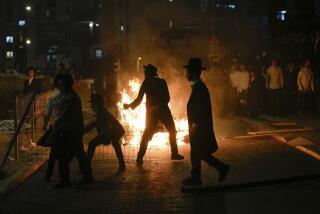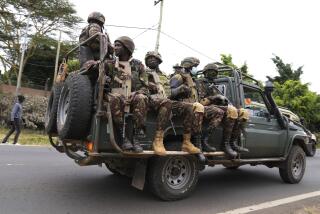Protests follow upholding of death sentences in Egypt soccer riot
CAIRO -- Egyptian protesters set fire to a police social club and attempted to block the Suez Canal on Saturday after a court upheld death sentences for 21 soccer fans and acquitted seven police officers accused in a deadly stadium riot last year.
Demonstrations in Port Said and Cairo marked the latest escalation in months of unrest and civil disobedience aimed at bringing down President Mohamed Morsi’s embattled Islamist-led government. The rage came amid a widening security vacuum spurred by a nationwide police strike.
The Port Said court case has been a parallel drama to the country’s broader political turmoil. A judge affirmed the death penalties against Port Said hooligans accused of killing 74 visiting Cairo fans after a match in 2012. The court also sentenced the city’s former security chief, Maj. Gen. Essam Samak, and a police colonel to 15 years in prison.
Seven lower-ranking officers and 21 Port Said fans were acquitted, infuriating Cairo’s hardcore soccer club members, known as Ultras, who had blamed security forces for instigating the bloodshed. Ultras quickly torched a police social club in Cairo as well as a soccer federation building along the Nile, sending plumes of smoke across the capital’s skyline.
One protester reportedly died from tear gas inhalation as police battled demonstrators near tourist hotels in downtown Cairo.
In Port Said, families of the accused were shocked by the upholding of the death sentences. They marched toward the Suez Canal, temporarily blocking ferries and unmooring speedboats in an effort to disrupt shipping lanes. The Egyptian military guided the drifting vessels back toward shore and officials said the vital commercial waterway was not affected.
“There is dissatisfaction with the verdict. We know that some are innocent and were wrongly tried and sentenced because the entire case was heavily politicized,” said Mohamed Elewa, a member of the Dustour political party in Port Said. “The question people here are asking is what will happen to Port Said.”
The soccer riot has spawned conspiracy theories and a sense of injustice. The verdict Saturday appeared calculated to appease both Port Said and Cairo fans but instead stoked fresh resentment and suspicions. Soccer fans believe the riot was orchestrated by security officials as retaliation against the Ultras for their hand in the 2011 revolution that overthrew Hosni Mubarak.
The Ultras, however, were split over how to react to the verdict. The group’s leadership said in a statement initially that the ruling was fair. But hundreds of Ultras then rampaged, hurling Molotov cocktails and preventing fire trucks from reaching the burning police social club.
“Today’s acquittals of most of the police ‘dogs’ are a clear sign that the trial was a sham and the officials we stressed should be convicted were intentionally found innocent,” said a later statement on the Ultras’ Facebook page, indicating a move by the leadership to appeal to its rank and file. “What happened today in Cairo is only the beginning of our rage.”
Port Said fans said the case against their compatriots showed they were scapegoats to competing political and security factions, including the military, which was ruling Egypt at the time of the stadium deaths. The motives behind the riot did not emerge from the trials.
Since January, when the first round of verdicts were read, more than 50 people, including six police officers, have been killed in Port Said in clashes between security forces and protesters. The city’s civil disobedience, which has spread to other cities along the Suez, symbolizes the sharpening disgust Egyptians have for the Interior Ministry.
Black-clad Central Security forces and police retreated from the city on Friday, leaving it in the hands of the military. Police have walked off the job at 60 stations across the country at a time when the International Monetary Fund is pressing Cairo for stability before it grants a $4.8-billion loan.
Officers blame Morsi for not training and equipping them while they have become the reviled face of an Islamist government that has failed to bridge political schisms and fix a downward spiraling economy. The police symbolized the brutality that bolstered Mubarak’s repressive regime but these days they seem confused over their role under a new president many of them despise.
“The Ministry of Interior is at point zero -- it’s even worse than during Mubarak’s time,” Mohamed El-Kady, a deputy police chief in El-Sharq, told Ahram Online news website. “The current ministry is asking us to be violent. They should know what the consequences of their actions will be.”
Special correspondent Manar Mohsen contributed to this story.
ALSO:
U.N. peacekeepers in Syria to be freed
Conservative brand of Catholicism thrives in Africa
Venezuela’s Hugo Chavez in his heyday: A look at ‘el comandante’
More to Read
Sign up for Essential California
The most important California stories and recommendations in your inbox every morning.
You may occasionally receive promotional content from the Los Angeles Times.











